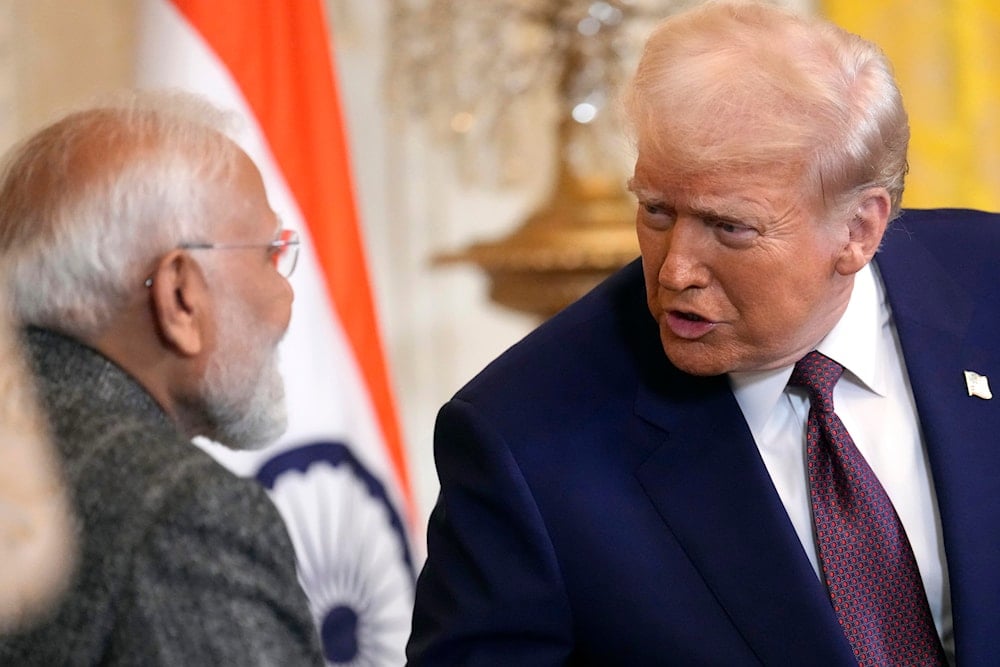India scraps F-35 deal with US as Trump slaps tariffs
Trump imposes 25% tariffs on Indian goods, blasts its defense ties with Russia, while India, rejecting a US F-35 deal, explores a trade response to avoid escalation.
-

President Donald Trump, right, speaks with India's Prime Minister Narendra Modi during a news conference in the East Room of the White House, on Feb. 13, 2025, in Washington. (AP Photo/Ben Curtis, File)
The Indian government is assessing its next move following US President Donald Trump’s decision to impose a 25% tariff on Indian goods, a move that reportedly caught policymakers in New Delhi by surprise. The tariffs are scheduled to take effect on August 1.
According to Bloomberg, Indian officials were “shocked and disappointed” by the sudden announcement. However, the government has ruled out immediate retaliation. Instead, it is considering trade adjustments to preserve relations with the United States, India’s largest trading partner.
The Economic Times (ET) reported on Friday that Commerce Minister Piyush Goyal addressed Parliament, stating, "The implications of the recent developments are being examined." He emphasized that the government is working with industry stakeholders and exporters to assess the impact and affirmed that India will take "all necessary steps to secure and advance our national interest."
According to the report, India is exploring ways to reduce its trade surplus with the US by increasing imports of US goods, such as natural gas, communication equipment, and gold. However, officials made it clear that new defense purchases are not being considered.
Despite US pressure to sell its advanced F-35 fighter jets, India has rejected the offer. During Prime Minister Narendra Modi’s visit to Washington in February, Trump personally pushed for the deal, but Indian officials ultimately declined, according to the report.
New Delhi conveyed that it is not interested in off-the-shelf military acquisitions and remains committed to the Make in India initiative, which emphasizes co-development and domestic production of defense equipment. However, Bloomberg reported that the Modi government is unlikely to approve any significant new defense deals with the US in the near term.
Trump attacks India over trade, Russia links
Trump launched a sharp criticism of India’s trade policies and its longstanding ties with Russia. In a series of posts on Truth Social, he stated: "India is our friend, we have, over the years, done relatively little business with them because their tariffs are far too high, among the highest in the world, and they have the most strenuous and obnoxious non-monetary Trade Barriers of any country."
The report mentions that he also condemned India’s defense and energy ties with Moscow, saying, "They have always bought a vast majority of their military equipment from Russia, and are Russia’s largest buyer of energy, along with China, at a time when everyone wants Russia to stop the killing in Ukraine, all things not good!"
In a later post, Trump added, "I don’t care what India does with Russia. They can take their dead economies down together, for all I care."
Despite the rhetoric, ET argues, India is opting for strategic patience. US officials have expressed frustration over India’s negotiating posture, as Treasury Secretary Scott Bessent told CNBC that the administration is "frustrated" by the lack of progress and criticized India’s foreign policy as too aligned with Russia.
Nevertheless, diplomatic engagement continues. India is preparing to host the next Quad summit, along with the US, Japan, and Australia. Former Commerce Secretary Ajay Dua told Bloomberg TV that India must be "a little more accommodating" in trade talks, while also noting that large-scale commitments in energy or defense are unlikely in the current climate.
Defense shift and regional implications
Moreover, India’s rejection of the F-35 highlights broader challenges in its defense planning. The Tejas program, aimed at producing an indigenous fourth-generation fighter, has struggled, with only 38 aircraft delivered, 17 of which are prototypes. Limited combat capability has restricted export potential and delayed production.
While no immediate alternatives for a fifth-generation fighter exist, India is turning to France, aiming to begin domestic production of Rafale jet components by 2028. Experts also point to Russia’s Su-57 as a more likely short-term option, given India's extensive existing military infrastructure tied to Russian systems.
As per the report, even though India has ruled out immediate retaliation, sources indicate that the government may challenge the new US tariffs, particularly on steel and automobiles, at the World Trade Organisation, depending on timing and strategic interest.
For now, New Delhi appears focused on maintaining stability while avoiding escalation. It is unwilling to enter a trade war, but also unwilling to be pressured into one-sided defense arrangements.
India’s broader objective remains clear: uphold national sovereignty while pursuing long-term economic and strategic autonomy, even amid external pressures.

 5 Min Read
5 Min Read










